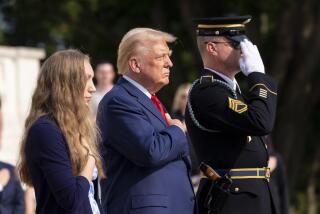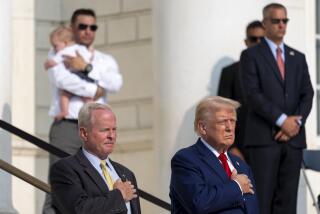Silence Returns to Arlington
- Share via
It began as an example of sloppy journalism and exploded into an intensely emotional outpouring of patriotic protest, before being put to rest by a cold recital of facts. Insight magazine, published by the Washington Times Inc., last week alleged that the Clinton administration had bent the rules to allow favored Democratic political contributors to be buried in Arlington National Cemetery. The story named no names. But talk radio quickly spread the claim and some in Congress and elsewhere rushed to register their anger. Anthony G. Jordan, the American Legion’s national commander, declared that “the 2.9 million men and women I represent are horrified and outraged at the possibility the report may be true.”
That possibility can now be dismissed. From start to finish, the story appears to have been a canard. Of the 69 people identified by Army Secretary Togo West as recipients of special permission to be buried at Arlington only one, M. Larry Lawrence, was a major Democratic contributor. At the time of his death he was also ambassador to Switzerland, which West ruled qualified him for burial at Arlington. Others for whom special permission was given included Supreme Court Justice Thurgood Marshall, the wife of former Chief Justice Warren Burger and, prospectively, C. Everett Koop, U.S. surgeon general in Ronald Reagan’s administration.
It’s true that in less than five years in office the Clinton administration has allowed more waivers for Arlington than the Reagan administration allowed in eight years. But the explanation is plausible: Mortality is catching up with many in the World War II generation. No evidence has been offered that political contributions won any of the 69 people identified by West a place in Arlington. While eligibility rules for burial there exist, the president and the Army secretary have the authority to make exceptions. Fifty-three such exceptions were granted during Reagan’s tenure and 33 while George Bush was president.
Insight magazine was irresponsible in printing unverified rumors. An allegation is not a fact and suspicion is not evidence. Those who embraced and spread Insight’s claims were had.
More to Read
Sign up for Essential California
The most important California stories and recommendations in your inbox every morning.
You may occasionally receive promotional content from the Los Angeles Times.













